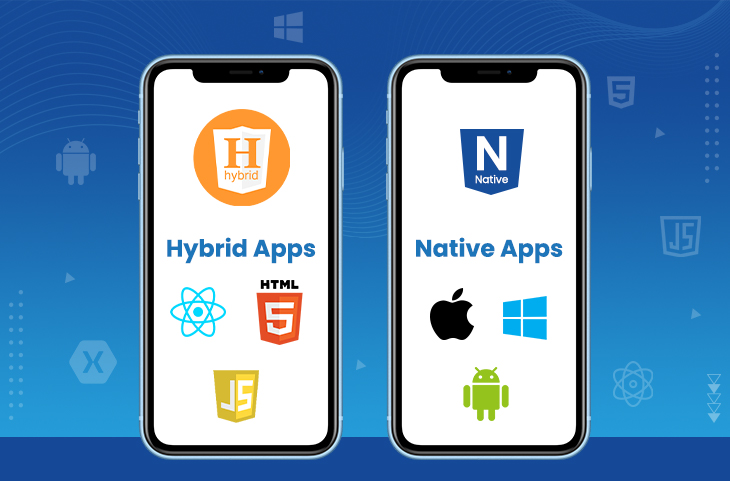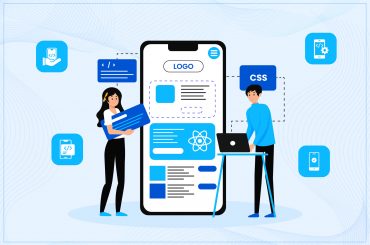Are you using a Native App or a hybrid app for representing your online goods or services? Both apps have their advantages and disadvantages the app companies may undergo providing for their user demand. Developers need to create both types of apps as per client prerequisites at times. Therefore, app owners have to go through the ups and downs related to both native and hybrid mobile apps. The app developers could give certain suggestions but can’t think beyond the vision of the app owner.
Some app companies first want to figure out what’s the difference between the two and consequently take a better decision as per their business model. In this way, comparing the two app development strategies become crucial for both developers and clients. Native Apps are very promising on speed and overall performance but initially can’t generate higher user traffic for mobile apps. On the other hand, Hybrid Apps cover a wider audience but sometimes fail on better app performance.
Through this article, we want to indicate the main differences between the two that could help you decide on your development project more effectively. You can also go for React Native Mobile App or the relative cross-platform app development approach at times as most of the developer audience prefer to go with the same. However, in this post, we’re specifically highlighting the Hybrid and Native mobile app development frameworks. Let’s proceed!
What Are Native Apps & Hybrid Apps?
Starting with the meaning, Native Apps comprises the mobile apps associated with a single platform or operating system. On the other hand, you may hear about web apps that are not apps but websites created in the form of mobile apps. Web apps have nothing to do with the operating systems, however are mostly found on Google Play Store.
Moving ahead is the Hybrid App and that’s is a combination of both native and web apps. As the concept suggests, Hybrid Apps are HTML5 apps that can behave like both native and web applications.
On the other hand, native mobile apps behave specifically for a particular OS (Android, iOS, macOS, Windows, etc.) All such app categories including React Native Mobile App are supposed to use some programming languages and tools that must be compatible with the corresponding OS.
Hybrid apps often behave like cross-platform apps as these apps can be written once and used on multiple platforms without any issue. PhoneGap is a renowned framework used to create both cross-platform and hybrid apps and is used by more than 16% of app developers worldwide. That’s what we conclude about the basic concept behind these mobile app categories.
You can reach out to Appikr anytime regarding your app business concern and get to know the best app category that suits your business model!
Native Apps vs Hybrid Apps: Which One to Go With?
The new app businesses and start-ups often doubt these app categories and they’re not able to figure out which one they should go with. Fortunately, there is a base of differences between Native App and Hybrid App that the companies can find out in the relative context and decide smartly. In this segment, we’re going to reveal those differences and help you get a proper insight into what you need to choose for your app business.
We’ll talk about the different features and functions that distinguish between the two apps effectively and support various app-building projects across the world. Let’s explore these factors together:
1. Speed
No other category of mobile app can beat the speed of a native mobile app as it is based on one single platform. Consequently, the app UI/UX, user accessibility, and overall functionality also differ on various devices and OS. This makes the app free from the burden of serving multiple users and OS. Whereas, the loading speed of the Hybrid app can vary after a few months of usage by different user groups out there.
2. Multiple Application
Unfortunately, Native Apps can’t be used for serving multiple platforms with a single language and app UI. The developers must know various languages to create multiple versions of the same app for different devices and platforms. Hybrid apps don’t let developers do anything like that and use a single language to write the app content & UI for different platforms.
3. Responsiveness
The app users like to take some actions or participate in the app exploration when using the mobile app for the first time. In this way, responsiveness becomes a crucial factor to represent the quality of the mobile app. Here, a native mobile app wins the race and delivers top-quality app usage to numerous app users out there. Because of comparatively low speed, hybrid apps are less responsive at times.
4. Built-in Elements
The Native App also accommodates various built-in components comprising Geolocation, Camera, Address Book, and other essential features that can help the mobile app become compatible with relative devices and OS anywhere anytime. Hybrid apps are not able to allow such features as they’re bound to different types of devices and platforms.
5. Server in Use
In the case of a Hybrid app, you’re not supposed to go for a new server purchase and can simply use the web server associated with the website to create the app too. This can save a lot of time and expense on part of the app company while deciding the project budget. On the other hand, the native mobile app can be very expensive at times to deploy and maintain over multiple platforms.
In this way, both Hybrid App and native mobile apps have their advantages and disadvantages that the developers and businesses have to undergo and need to plan the future opportunities and threats accordingly.
Conclusion
Many companies are investing in both app development project categories and getting huge business opportunities via app users and customers. You’re advised to see the contemporary market trend and decide accordingly. You also need to review your business category and overall budget before deciding on the best app development approach among Native Apps & Hybrid Apps. Talk to our highly experienced app development experts at Appikr and get better advice regarding your business growth today!!





